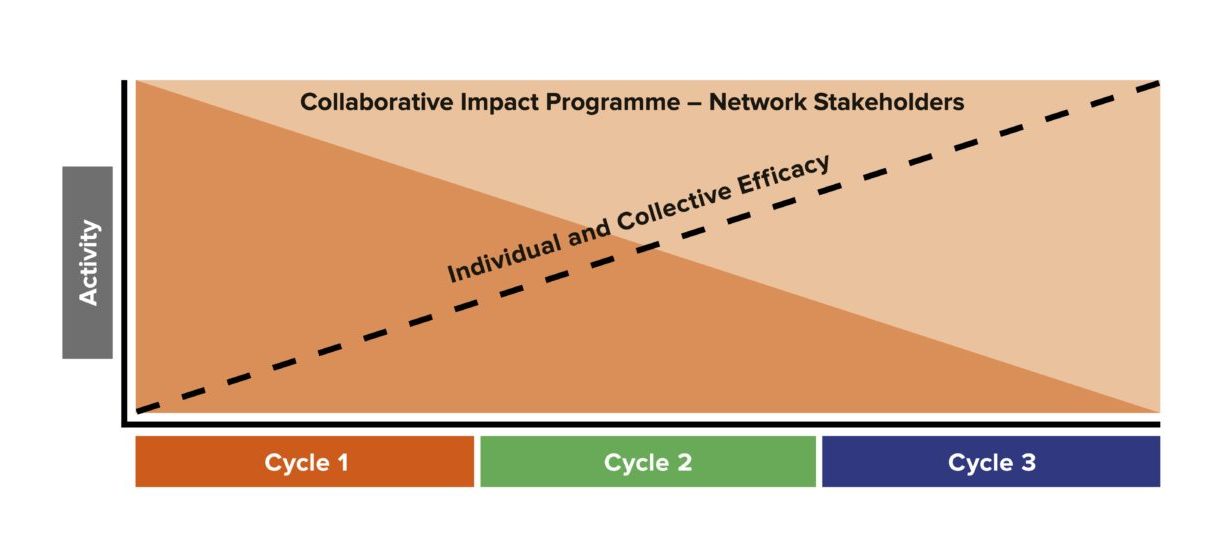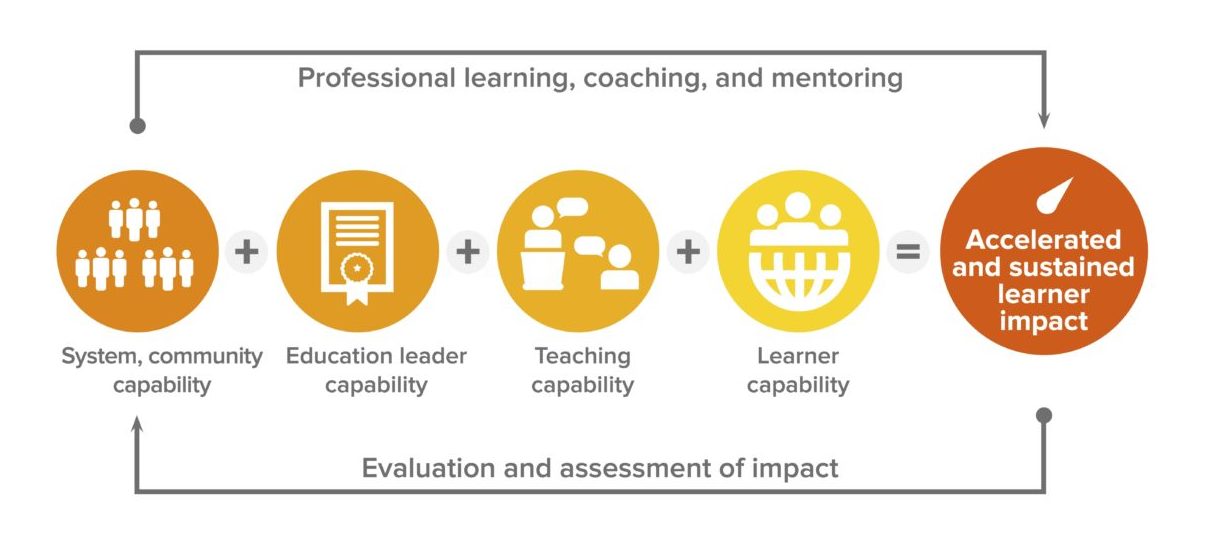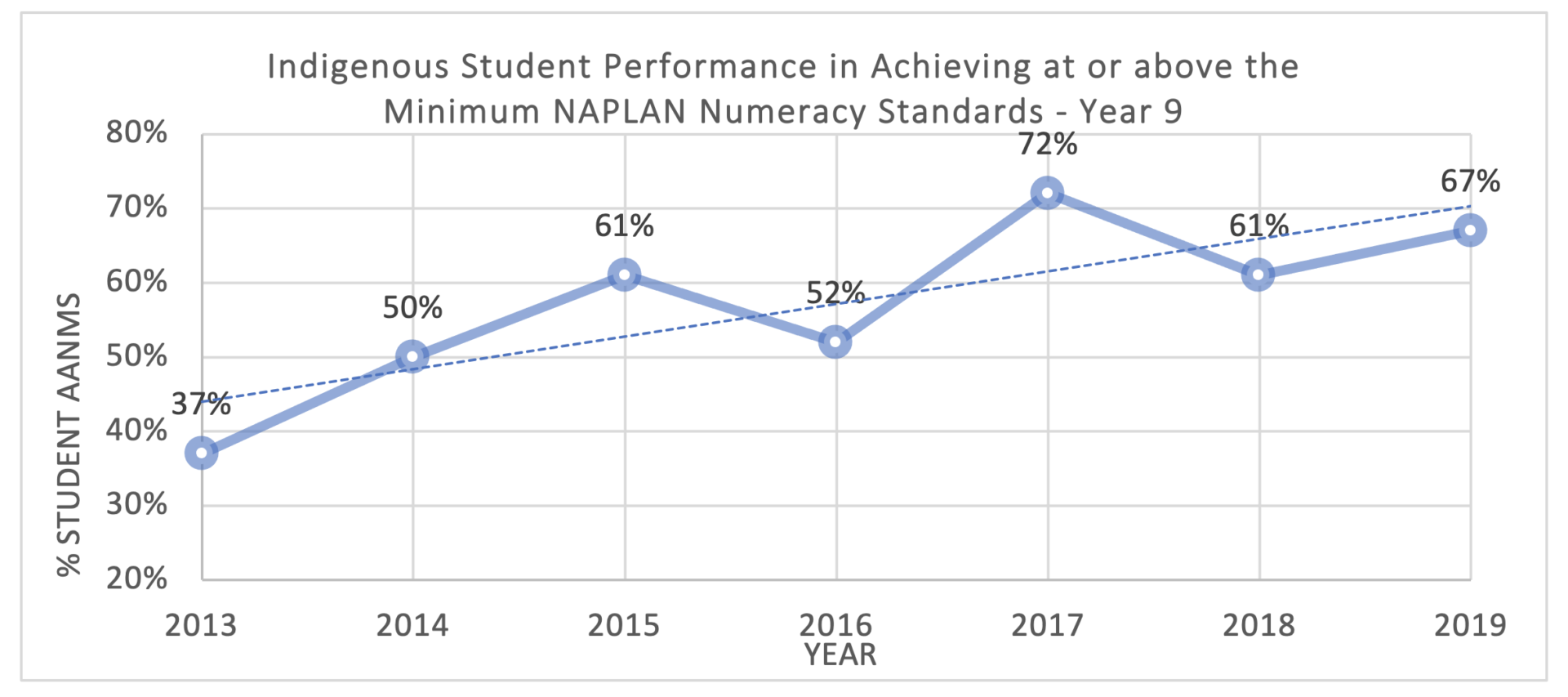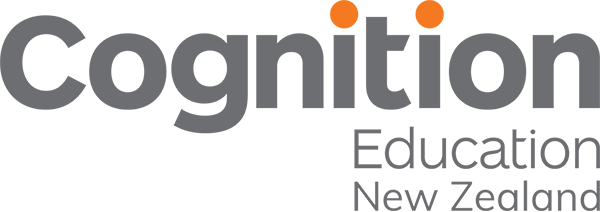Cognition has provided professional learning opportunities to more than 2500 leaders and teaching staff in 153 schools in the Northern Territory, Australia.
Using NAPLAN Data, a 2011 review of Northern Territory student performance, found learning gaps between Northern Territory students and students in the rest of Australia.
For the Northern Territory Department of Education (Department) this highlighted a need for a system-wide intervention, and they set a goal to become the most improved and most successful in Australia to enable all students to achieve their aspirations.
From 2012 and to 2021, Cognition has worked collaboratively with the Department. Each of three contracts has been focused on supporting Department leaders, education leaders and teaching staff in schools, to significantly improve learning outcomes for Indigenous and all learners across the Northern Territory, stretching from Uluru in the South, to Arnhem in the North.
Cognition Collaborative Impact professional learning programs have been used to guide a whole system focus on the growth and sustainability of a high-quality departmental and school instructional leadership and teaching efficacy or capability (both individually and collectively). This was expected to better enable marginalised and all learners to maximise their engagement, learning and achievement in order to better able students to participate socially and economically in society.
Recent NAPLAN data provides evidence that professional learning has contributed to, and supported, the Northern Territory towards becoming the most improved education system in Australia. In respect of long-term gains, students who were tested in Year 3 in 2017 and again in Year 5 in 2019 improved in all domains at levels greater than the rest of the country.
Read more on our Collaborative Impact model used in this project, a Discover, Design, Deliver, Evaluate process which has since evolved into The Cognition Way.
Discovery Stage
Beginning in August 2012, Cognition helped to establish a system-wide Guiding Coalition, representative of the Department, school leadership, teaching staff and Cognition.
The role of the Guiding Coalition has been to work with and alongside Cognition to:
- Contextualise the Cognition Collaborative Impact programme
- Clarify the professional learning needs of schools and the education workforce
- Scope, monitor and assess the outcomes and impact of annual system-wide professional learning programmes
- Grow a local capability for Impact Coaching expected to support the activation and embedding of the professional learning within the participants work-context
- Grow a system capability for leading the Collaborative Impact professional learning beyond the completion of Cognition contracts.
A ‘Capability Assessment’ tool, informed by Professor John Hattie Visible Learning synthesis (2009) developed by Cognition, was implemented across a sample of Northern Territory schools to identify their specific needs and the education challenges facing teachers, instructional leaders, and learners.
The evidence collected was mapped and prioritised to enable the Guiding Coalition and Cognition to agree on:
- the overarching priorities to be addressed in professional learning programmes
- the success criteria (outcomes and impact) for the programmes of professional learning
- frameworks, and methods to monitor and assess the:
- quality and outcomes of the professional learning
- impact on teaching and instructional leadership individual and collective efficacy.
Design Stage
The principles used to guide the professional learning programmes each year have been:
- COLLABORATION and GRADUAL RELEASE – A focus on growing a sustainable Northern Territory capability to replicate the Collaborative Impact programme stages independently, beyond the completion of the Cognition engagement (note 1).
- EVIDENCE INFORMED – Professional learning programmes will draw on global and local research evidence and evidence of effective practice
- ITERATIVE – Professional learning programmes will be reviewed and re-designed annually to value the outcomes and impact of the professional learning, to recognise the growth and development of individual and collective efficacy or capability, and to provide for ongoing and emerging workforce needs
- IMPACT COACHING – An Impact Coaching network and capability will be developed to support the delivery of the professional learning and to support professional learning participants to activate and embed inquiry cycles focused on their learning in their work contexts
- A WHOLE OF SYSTEM APPROACH – The agreed design will be endorsed at all levels of the Department and the school system – be well-resourced and be given sufficient time to be delivered, activated, and embedded
The theory of improvement that was then agreed and used to underpin the professional learning solution – has become known locally as the Collaborative Impact ‘plus, plus, plus’ approach (note 2).
The Professional Learning Programs scoped and designed were:
Relationships-based Teaching and Learning:
- the growth of a sustainable individual and collective teaching efficacy
Leading Learning:
- learning for aspiring, emerging and more experienced leaders within the system, schools and other education providers to become effective instructional leaders
Impact Coaching
- the growth and development of a system-wide impact coaching capability
Facilitating Effective Professional Learning
- coaching for aspiring system and school leaders to facilitate the delivery of professional learning within the Northern Territory ongoing.
Delivery Stage
A key feature associated with the implementation of all professional learning programs has been Cognition’s commitment using a range of research-proven methods.
The delivery framework has included: face-to face workshops; access to online resources and tools; online opportunities for networks of learners to share their learning and activation of their learning, school visits, and in-school impact coaching.
Over time, however, Cognition delivery has continued to evolve to better meet the contexts and needs of learners, and the challenges and opportunities presented by specific learning context/s and globally.
And, in 2020, as a response to the global COVID-19 pandemic, all professional learning was delivered utilising a fully ‘blended learning’ approach, utilising the online Microsoft team’s application and featuring, in addition to the above:
- Online workshops, materials, tools, and activities
- Expert led- video and webinar opportunities
- In-context, and cross-context, breakout groups
- In-context impact coaching
- Virtual and online mentoring, feedback, and feedforward for impact coaches.
Evaluation
Throughout the nine years of professional learning in the Northern Territory, Cognition has worked alongside the Guiding Coalition and Department management to seek, participant feedback and feedforward of all workshops and blended learning programmes delivered.
On-line surveys have been completed by participants at the end of each professional learning event and reported to the Department management, Regional network leaders, and the Guiding Coalition. These have been focused on the internationally recognised Donald Kirkpatrick four-level Training Evaluation Model.
Throughout the duration of the three contracts, the responses to all questions averaged >3.00 on a 4-point Likert scale, where a score of 1.00 indicated a strong disagreement with the survey question and a scope of 4.00 signalled a strong agreement to the question.
The data from 381 participants in the 2020 professional learning is summarised (note 3).
All data and reports have been used to inform the next series of professional learning discovery, design, and delivery.
Outcomes and Impact:
In 2021 Cognition and the Department agreed to complete an end-of-contract assessment of the outcomes and impact of the Cognition led professional learning.
An online survey was co-designed, aligning with the Kirkpatrick model, and then activated with:
- Participants in each of the professional learning programmes
- School leaders of the participants
Semi-structured focus groups were co-designed, again aligning with the Kirkpatrick model, and then activated with:
- School and Department leaders
- Participants in the professional learning focused on enabling the Northern Territory to continue to lead the professional learning programmes once Cognition finished.
Quantitative and sentiment analyses completed on all data and responses has found that participants in the professional learning, school leaders and Department staff are very positive about the professional learning programs.
“Great learning that can be easily contextualised to the NT perspective” (School Leader)
“We are applying the new learning to almost every aspect of the school and have shared most of the readings covered in the programme with other teams and school leadership”
(School Leader).
Shared sentiments from all groups identify that the professional learning:
- was meaningful, relevant, and engaging and was well-aligned to the Northern Territory contexts for learning
- is promoting collaborative partnerships and inquiry within schools and across some schools
- is improving the confidence of teacher coaches to challenge and improve teachers’ practice and as a result, is building schools-wide relational trust
- is improving school-wide understandings of the change and improvement process.
Conclusions:
Overall, both Cognition and Department have agreed that both organisations commitment to work collaboratively throughout the design, delivery, and assessment of the outcomes and impact of the professional learning programs has been a strength and enabler of the joint expectation to:
- embed a system-wide, network, and individual entity sustained focus on ongoing quality professional learning for instructional leaders, and teachers within the NT
- build a NT capability to lead and manage the next steps of the three CIP professional learning programs going forward.
We are also pleased to report that the performance of Indigenous students achieving at or above the NAPLAN standards has also improved significantly (as illustrated in note 4).
The Northern Territory also recorded the largest gain in indigenous student attendance across the whole of Australia.
We are proud to have evidence that the Collaborative Impact Program has supported NT towards becoming the most improved education system in Australia.
Note 1

Note 2

Note 3

Note 4


